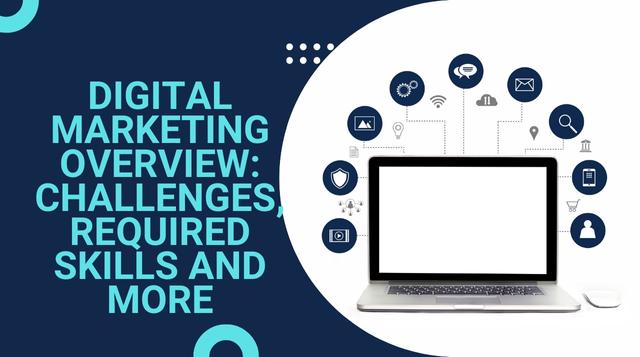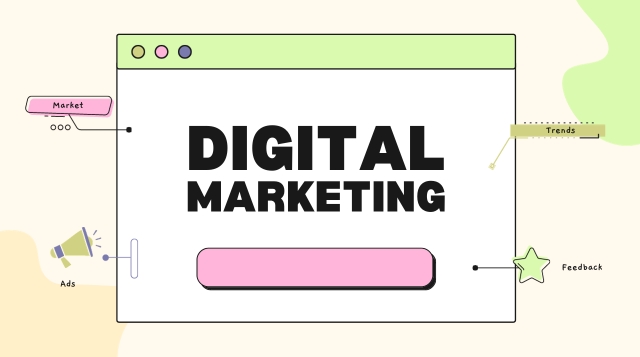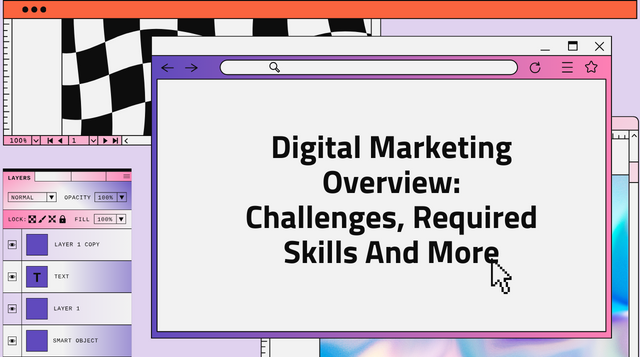Digital Marketing Overview: Challenges, Required Skills And More
Digital Marketing:- The use of websites, applications, mobile devices, social media, search engines, and other digital platforms for the purpose of promoting and selling goods and services is known as digital marketing. In the 1990s, as the internet became more widely used, digital marketing began to gain popularity.
Digital marketing is frequently seen as an extra tool for businesses to reach customers and comprehend their behaviour, and it incorporates many of the same concepts as conventional marketing. Traditional and digital marketing methods are frequently combined by businesses. However, internet marketing has its own unique set of difficulties.
How Digital Marketing Works
To increase their market share and advertise their goods and services to prospective customers, businesses can employ a variety of marketing strategies and media. It takes a combination of sales acumen and advertising expertise to succeed. These responsibilities are handled by professional marketers, either in-house at specific businesses or outside at marketing agencies that could work with a wide range of customers.
In the past, businesses relied solely on print, radio, and television for their marketing efforts. The internet provided businesses a new means to reach customers and gave rise to digital marketing, even though those alternatives are still available.
Companies were compelled to reconsider their marketing strategies and expenditures in light of the emerging technology and trends. In the early stages of digital marketing, email became a prominent medium for marketing. Subsequently, the emphasis switched to search engines like Netscape, which enabled companies to mark and keyword goods in order to get visibility. The emergence of social media platforms such as Facebook allowed businesses to monitor user data and target extremely precise audiences with their messaging.

Nowadays, businesses may more easily promote their goods and services to customers wherever they may be thanks to smartphones and other portable electronics. According to a Pew Research Centre research from 2022, 76% of American people have used mobile phones to make internet transactions.
Types of Digital Marketing Channels
Digital marketing channels have evolved since the 1990s and continue to do so. Here are eight of the most common channels in use today.
Website Marketing
Businesses frequently utilise their own website as the focal point of their online marketing campaigns. The most successful websites give a distinct and unforgettable image of the company, together with its goods and services. These days, a website has to load quickly, work well on mobile devices, and be simple to use.
Pay-Per-Click Advertising
Marketers may target audiences on news and other websites and digital platforms by using pay-per-click (PPC) advertising. Advertisers may create PPC campaigns on Facebook, LinkedIn, X (previously Twitter), Google, Bing, Pinterest, and other platforms, and have their advertisements displayed to users who enter phrases associated with their goods or services.
Users can be divided up by these campaigns according to their geography, hobbies, or certain demographics (including age or gender). Facebook Ads and Google Ads are the most popular PPC services.
Also Read:- 6 Major Benefits Of A Health Insurance Policy In 2023
Content Marketing
Reaching potential consumers with interesting textual, graphic, or video information is the aim of content marketing. After being posted on a website, the information is typically pushed using email marketing, social media, search engine optimisation, and even pay-per-click advertising. Compared to advertising, content marketing aims to be more understated, and the sponsor’s intended product or service may or may not be prominently shown.
Email Marketing
Despite the misconception that emails are spam, email marketing remains one of the most successful digital marketing platforms. To get names for their email lists, many digital marketers utilise their various digital marketing platforms. They then attempt to convert those leads into customers through email marketing.

Social Media Marketing
A social media marketing campaign’s main objectives are to create trust and increase brand recognition. As you get more experienced with social media marketing, you may utilise it as a direct marketing or sales channel as well as to generate leads. Two instances of social media marketing are tweets and posts that are promoted.
Affiliate Marketing
One of the earliest types of marketing is affiliate marketing, which has been revitalised by the internet era. In affiliate marketing, businesses and private “influencers” sell the goods of another business in exchange for a fee each time a lead is generated or a transaction is completed. Numerous well-known businesses, such as Amazon, have affiliate programmes that reward affiliates who assist sell their items with millions of dollars.
Video Marketing
Many internet users use websites such as YouTube for relaxation, learning how-to videos, reviews, and before making a purchase. To conduct a video marketing campaign, marketers can utilise any of a number of platforms, such as Facebook Videos, Instagram, and TikTok. Businesses who combine video with SEO, content marketing, and more extensive social media marketing efforts find the greatest success with it.
Text Messaging
Additionally, businesses employ text messages—also referred to as SMS, or short messaging service—to provide updates about their newest offerings and specials. Texting is another tool used by political candidates and nonprofit organisations to advertise and raise money. These days, a lot of marketing initiatives enable customers to donate or make a payment with just a text message.
Key Performance Indicators (KPIs) in Digital Marketing
Key performance indicators, or KPIs, are employed by both traditional and digital marketers. KPIs enable businesses to assess the long-term effectiveness of their marketing campaigns and evaluate how they stack up against those of their rivals.
Click-through rate: By calculating the percentage of individuals who clicked on a certain advertisement out of all those who may have seen it, this key performance indicator (KPI) is frequently used to assess the efficacy of internet advertising.
Conversion rate: The conversion rate compares the proportion of individuals who completed a desired action, such completing a purchase, to the overall audience that a certain advertisement or campaign reached, going even farther than the click-through rate.
Social media traffic: This monitors the amount of users that engage with a business’s social media pages. Likes, following, views, shares, and/or other quantifiable activities are included.
Website traffic: This measure counts the number of individuals who visit a business’s website in a specific amount of time. It may be used, among other things, to assist businesses in determining how well their marketing initiatives are bringing customers to their website.
Digital Marketing Challenges
For marketers, the digital environment presents unique obstacles. For instance, digital channels are become more and more commonplace, and marketers need to stay up to date and learn how to use them efficiently. It may be difficult for marketers to evaluate and effectively utilise the vast amounts of data that these platforms enable them to collect.
Most importantly, it’s getting more and harder to get customers to pay attention since they are constantly exposed to digital advertisements and other distractions.
What Is SEO in Digital Marketing?
The term “search engine optimisation” (SEO) refers to a number of strategies used by businesses to try and improve website traffic and search engine ranking. The likelihood that a customer will see a website and maybe click to visit it increases with its position on the search results page.
What Is Internet Marketing?
Technically, internet marketing is marketing that takes place solely on the internet. As such, it is a subset of digital marketing, which can use many different kinds of digital platforms, including the internet, to reach its desired audience.
What Is Implicit Bias in Digital Marketing?
Messages that inadvertently propagate unfavourable perceptions or attitudes towards particular groups are referred to as implicit prejudice, sometimes referred to as unconscious bias. It has received special attention in the realms of marketing and advertising in recent years. It may show up in digital marketing in something as basic as the stock photo selection for a campaign.
Without without realising it, firms could, for example, exclusively utilise photos of heterosexual White people, leaving out Black, Indigenous, and other people of colour, as well as people with varied body shapes and abilities. Although ostensibly objective algorithms are frequently used by digital marketers to assist in the creation of their campaigns, the algorithms themselves may contain unintentional biases from the people who built them.
Read More:- What is Digital Marketing?

आप सभी का आपकी अपनी वेबसाइट businessplanhindi.in में स्वागत है मुझे बिज़नेस, पढाई, और जनरल नॉलेज के बारे में पढ़ना और उसकी जानकारी देना बहुत पसंद है इसी लिए मैंने ये वेबसाइट बनायीं है आप सभी अपना प्यार इस पर बनाये रखे धन्यवाद

One thought on “Digital Marketing Overview: Challenges, Required Skills And More”